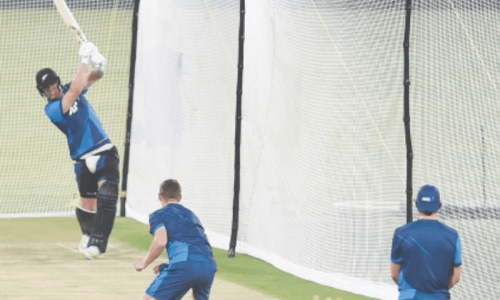
IN present day cricket all-rounders are a rarity. There are not many around, like it was in the eighties when charismatic figures like Imran Khan, Ian Botham, Kapil Dev and Richard Hadlee ruled. In the modern day game not many qualify to be in the same league.
But South Africa’s Jacques Kallis is unquestionably an exception. At 37 he still wields tremendous influence, whether in the middle as the backbone of his country’s batting line-up or when bowling at a brisk pace or standing in the slip cordon where he is ranked as one of the best in business.
His 13,128 runs at Test level in 162 matches which also includes 44 hundreds and his 288 wickets coupled with his impressive ODI record of 11,498 runs and 270 wickets makes him unarguably a unique individual in world of cricket.
His reading of the game and his opinion about people and players involved with this game carries a lot of weight and makes big news. In a recent interview on TV channel Supersports of South Africa, when Kallis was asked to rate the best opening fast bowler he ever faced, he replied: “In my opinion Wasim Akram of Pakistan was the best pace bowler that I ever faced. Being able to swing the ball both ways with pace made him the most dangerous bowler and combined with Waqar Younis’ reverse swinging yorkers bowled with as much venom, it was a daunting task to play them. Wasim and Waqar in tandem were the best.”
The Kallis comments were disclosed to me by Dr Aaron Ali Bacher, the former South African Test captain and a legendary cricket administrator of the game who had tirelessly campaigned during his country’s isolation from the game for 21 years to bring back South Africa to international cricket.
Bacher was the last South African captain to achieve a whitewash in a Test series when his team that included Mike Proctor, Eddie Barlow, Graeme Pollock, Peter Pollock and Barry Richards inflicted a 4-0 defeat on Australia at home in the 1969-70 series before being sent into isolation for their government’s policies of apartheid.
Bacher later became the head of United Cricket Board of South Africa and the Managing Director of the 2003 ICC World Cup and was rewarded for his efforts and services to the game by the then South African President, Dr Nelson Mandela.
As the Chairman of ‘Right to Care’ charity for Aids sufferers, Dr Bacher now spares time to interview sports dignitaries on the sports channel.
In a television programme titled ‘In Conversation’, he has in the recent past interviewed Sachin Tendulkar, Mark Boucher and Kallis and also the Paralympian Oscar Pestorius who is now facing trial for the alleged murder of his girlfriend Reeva Steenkamp. I was with Dr Bacher and his wife Shira last Tuesday in Fordsburg area of Johannesburg where we tasted a number of Pakistani dishes. Settling down after dinner, he talked at length about cricket and cricketers and on various subjects and it was in the course of this conversation that he disclosed about Kallis interview and his verdict on fast bowlers.
“I had asked Kallis about the best fast bowlers that he faced and named Courtney Walsh, Curtley Ambrose, Glenn McGrath, Brett Lee, Wasim and Waqar,” recalled Bacher.
“Kallis did not take a second to respond to my question and named Wasim Akram as the best and Waqar his opening partner as a very good bowler,” said Bacher. “It did not surprise me, Kallis certainly was spot on because the Ws pair was so good and fascinating to watch.”
Wasim’s 414 wickets in Tests and 502 in ODIs are a testament to his brilliance as a bowler and also as an all-rounder of substance. Same goes for Waqar whose 375 victims in Tests and over 400 wickets in ODIs tell the same story.
Shane Warne, according to Kallis, was the best spinner that he played against, said Bacher. “Warne was unbelievable, not because of his accuracy but the near perfect art he made of leg-spinning,” Kallis had admitted.
And the best batsman Kallis bowled against was the Trinidadian genius Brian Lara whom he would rate a tad above Sachin tendulkar because of his ability to manipulate the field.
When asked about Sir Garfield Sobers, he did not believe though that he is as good as him. He was being modest alright but it is also a fact that none can deny the colossus Sobers really was.
Kallis’ only wish now is to win the World Cup for South Africa. At 37 he still hopes to be there when 2015 ICC World Cup is held Down Under. He was part of two matches in the Test whitewash of Pakistan before pulling out from the third and final Test because of injury and will not be taking part in the ODIs against Pakistan which starts on Sunday at Bloemfontein.
But one thing is for sure, if he carries on with the same zest and form Kallis would obviously be the top choice for South Africa in the next World Cup.














































